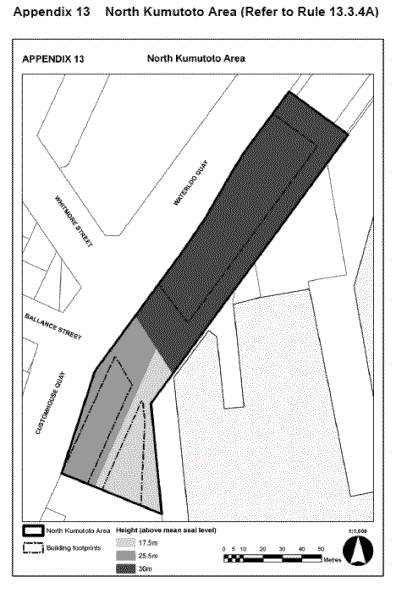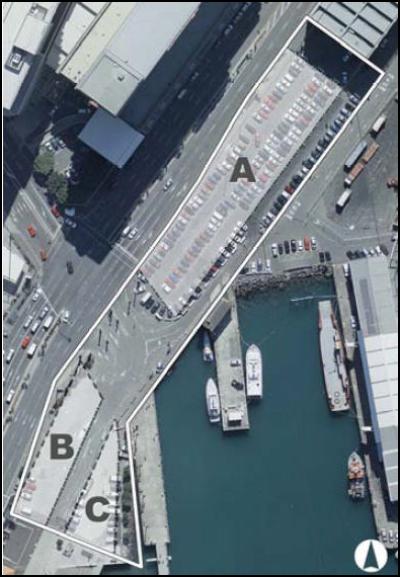City Council plans
to curb public
opposition to new waterfront
buildings
by Lindsay Shelton
Just days before councillors are due to debate major amendments to the city’s District Plan, the Wellington City Council has released 79 pages of documents about the proposed changes (in four parts: Part 1, Part 2, Part 3. Part 4).
The proposals appear to have been given impetus by the council’s defeat in the Environment Court, which stopped its plan – approved by council officers - to allow a Hilton Hotel to be built on the Outer T of Queens Wharf.
An immediate effect of the changes would be to allow council officers to approve new buildings in the Kumutoto area of the Wellington waterfront, without notifying the public of the individual building plans and thereby removing any right to object.

Observers who have studied the council documents believe that this power could also stop the possibility of appeals to the Environment Court against any specific new buildings, such as the appeal which stopped the Hilton.
Councillors are to debate the changes at a meeting on Thursday (December 4.) The documents appeared on the council’s website the previous Friday, before copies had been received by councillors themselves.
The changes – by which the council would grant itself powers to give the go-ahead to new buildings without any public scrutiny - have been named Variation 11.
Page 10 of the 34-page Appendix 1 (which is part of the proposal for change) provides a map showing where the council proposes to allow three new buildings in the Kumutoto area. Site 10, the biggest site, will allow a building which is six storeys high.
Page 12 of the Appendix provides an aerial view of the footprints of the three new buildings.

A design guide for the area is proposed, but the council says that developers would have “an infinite range of design solutions” for new buildings, subject only to the design guide.
One immediate effect would be to reduce views of Wellington harbour.
The current vistas at the Whitmore Street gates would be replaced by “space framed by buildings on either side.” The preference of the council’s planners: that “buildings … should frame the views.”
The proposed changes would not completely remove the public’s ability to comment on the council’s enthusiasm for big new buildings on the edge of the harbour.
But public input will be restricted to involvement “at the initial plan variation stage.”
After this initial planning period, states the council, “there may not be the opportunity for further challenge and possible appeals when subsequent resource consent hearings are made.”
For the council, this will “greatly simplify the process.”
For the citizens of Wellington, any ability to oppose specific new buildings on the waterfront will have been ended.
The council doesn’t deny that there has been opposition in the past. Attachment 1 of its proposal bravely acknowledges two major examples (in 1989 and 1998) of public opposition to large new buildings on the waterfront, opposition which was so strong that planning regimes were replaced.
It now appears to have invented a strategy which would ensure that any future opposition wouldn’t be given a chance.
What happens next?
If the proposals are approved by councillors on Thursday night, the public can scrutinise the 79 pages of documents and decide whether to object to the overall plan for Kumutoto. If specific plans for individual buildings are to be removed from public scrutiny, then the initial planning process – including the new design guide - will be the only chance for the public to be heard.
And what’s in store for the rest of the waterfront? There’s a general expectation that the same policy is likely to be applied to other areas including Waitangi Park, where the council has kept four sites which it specifies are for big new buildings.
2 December,
2008




 Gordon Campbell: On The Language Of Healthcare, And Mink DeVille
Gordon Campbell: On The Language Of Healthcare, And Mink DeVille David Cooke: Languages In Hospital
David Cooke: Languages In Hospital Binoy Kampmark: Weak Endeavours - The Meekness Of Australia’s Anti-Corruption Body
Binoy Kampmark: Weak Endeavours - The Meekness Of Australia’s Anti-Corruption Body Binoy Kampmark: Widening The War - The US Sends Troops To Israel
Binoy Kampmark: Widening The War - The US Sends Troops To Israel Martin LeFevre - Meditations: Beethoven’s 7th And Conducting Beauty Beyond The Mind Of Man
Martin LeFevre - Meditations: Beethoven’s 7th And Conducting Beauty Beyond The Mind Of Man Binoy Kampmark: Nuclear Fever - War Mongering On Iran
Binoy Kampmark: Nuclear Fever - War Mongering On Iran